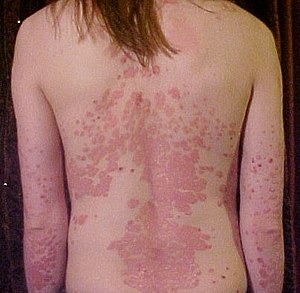Antipsoriatics
| Psoriasis | |
|---|---|
 |
|
| Back and arms of a person with psoriasis | |
| Pronunciation | |
| Specialty | Dermatology |
| Symptoms | Red, itchy, scaly patches of skin |
| Complications | Psoriatic arthritis |
| Usual onset | Adults |
| Duration | Long term |
| Causes | Genetic disease triggered by environmental factors |
| Diagnostic method | Based on symptoms |
| Treatment | Steroid creams, vitamin D3 cream, ultraviolet light,immune system suppressing medications such as methotrexate |
| Frequency | 79.7 million / 2–4% |
| Classification | |
|---|---|
| External resources |
Psoriasis is a long-lasting autoimmune disease which is characterized by patches of abnormal skin. These skin patches are typically red, itchy, and scaly. They may vary in severity from small and localized to complete body coverage. Injury to the skin can trigger psoriatic skin changes at that spot, which is known as the Koebner phenomenon.
There are five main types of psoriasis: plaque, guttate, inverse, pustular, and erythrodermic. Plaque psoriasis, also known as psoriasis vulgaris, makes up about 90% of cases. It typically presents with red patches with white scales on top. Areas of the body most commonly affected are the back of the forearms, shins, around the navel, and the scalp. Guttate psoriasis has drop-shaped lesions. Pustular psoriasis presents with small non-infectious pus-filled blisters. Inverse psoriasis forms red patches in skin folds. Erythrodermic psoriasis occurs when the rash becomes very widespread, and can develop from any of the other types. Fingernails and toenails are affected in most people at some point in time. This may include pits in the nails or changes in nail color.
Psoriasis is generally thought to be a genetic disease which is triggered by environmental factors. In twin studies, identical twins are three times more likely to both be affected compared to non-identical twins; this suggests that genetic factors predispose to psoriasis. Symptoms often worsen during winter and with certain medications such as beta blockers or NSAIDs. Infections and psychological stress may also play a role. Psoriasis is not contagious. The underlying mechanism involves the immune system reacting to skin cells. Diagnosis is typically based on the signs and symptoms.
...
Wikipedia
